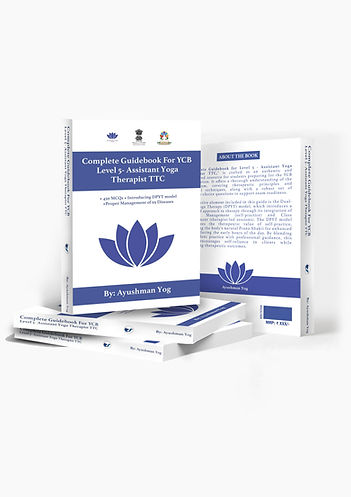Self - Paced Course
Assistant Yoga Therapist
The YCB Assistant Yoga Therapist course with the Government of India offers an exciting opportunity for those passionate about yoga therapy. This certification not only enhances your professional credentials but also equips you with the expertise to promote wellness and healing through Dual-Phase Yoga Therapy (DPYT) a unique therapeutic approach developed by Ayushman Yog.
Material Fee- 999 INR - Indian Students
140 USD (Or, as per exchange rate)- Foreign Nationals
Duration- Self Paced
Eligibility- Level 1 Yoga TTC
Highlights
-
Complete digital study material of YCB Assistant Yoga therapist (Theory & Practical).
-
Material includes the following and more:
-
Usage Of Props - Blocks, Belts, Rops, Chairs etc.
-
Introduction to Naturopathy
-
Introduction to Ayurveda
-
DPYT- Dual Phase Yoga Therapy Model
-
Proper Management of 10 common diseases through DPYT model
-
Pranayama
-
Yog Nidra- IRT, QRT, DRT
-
-
Self -Paced mode with flexibility of studying at your own pace
-
Workshop (Live)- Jala Neti, Vamana Dhauti, Trataka, Agnisara Kriya, Shankha Prakshalana

Benefits Of Becoming Assistant Yoga Therapist
-
Facilitate healing through holistic yoga practices
-
Create personalized therapeutic plans for each client.
-
Integrate knowledge from various disciplines for a comprehensive approach to health and healing.
-
Register with the prestigious Yoga Certification Board.
-
Experience deep satisfaction from making a meaningful impact on peoples' lives.

Govt Certification -Yoga Certification Board
The Yoga Certification Board (YCB), a body functioning under the Ministry of AYUSH, conducts the Level 5- Assistant Yoga Therapist examinations every month.
We collaborate with an authorized examination body named MSPL, through which we facilitate the exam process for our students. Each month, we share the upcoming exam dates with our students. Those who feel prepared can inform us of their preferred date, and we will assist them in booking their examination accordingly.
Exam Structure- Both exams are conducted online on the same day, usually on a Saturday or Sunday. The structure includes:
-
MCQ-Based Theory Exam
-
Format: Multiple Choice Questions
-
Passing Criteria: Minimum 70%
-
-
Demonstration Exam
-
Format: Practical demonstration of yoga techniques
-
Passing Criteria: Minimum 70%
-
Upon successful completion of both exams, students are awarded a Level 5 Certificate with designation - Assistant Yoga Therapist, which can be downloaded directly from the official government dashboard.
Fee Structure
Title | Course Fee | YCB Examination Fee |
|---|---|---|
Foreign Residents | 140 USD (Or, As Per Exchange Rate) | 140 USD (Fixed, As Per Govt Rules) |
Indian Residents | 999 INR | 4450 INR |
*Examination fee is decided by the Board and subject to change.
Re-Examination Process-
-
If the candidate fails the Theory Exam but passes the Practical Exam:
-
They will be given one additional attempt to appear for the Theory Exam only, free of cost.
-
This free re-attempt must be taken within 3 months of the date of the original examination.
-
-
If the candidate fails the Practical Exam:
-
They will need to reappear for both the Practical and Theory Exams.
-
In this case, the full examination fee of ₹4450/- must be paid again.
-
There is no time limit for this re-exam attempt—it can be taken at any future scheduled exam.
-
Importance of Assistant Yoga therapist course with
Govt Of India.
In recent years, there has been a notable shift towards holistic approaches to health and well-being, with yoga therapy emerging as a prominent modality. Understanding the need to standardize and regulate this field, the Government of India has taken proactive steps by establishing the Yoga Certification Board (YCB) and introducing specialized courses, including the Assistant Yoga Therapist program.
Why YCB Assistant Yoga Therapist Course Matters:
-
Quality Assurance and Standardization: The YCB Assistant Yoga Therapist course ensures that practitioners meet standardized benchmarks of proficiency and ethics, thus assuring clients of receiving high-quality care. This government-backed certification adds credibility and trust to the therapist's practice, fostering confidence among clients.
-
Professional Recognition: Completion of the YCB Assistant Yoga Therapist course provides formal recognition of one's expertise in the field of yoga therapy. This recognition not only enhances career prospects but also opens doors to collaborations with healthcare institutions, gyms, wellness centers, and corporate organizations seeking certified professionals.
-
Comprehensive Curriculum: The curriculum of the YCB Assistant Yoga Therapist course is designed to provide a comprehensive understanding of yoga therapy principles, anatomy, physiology, psychology, and therapeutic techniques. Participants gain practical insights through hands-on training, case studies, and supervised clinical experience, preparing them to address diverse client needs effectively.
-
Alignment with Government Initiatives: By enrolling in the YCB Assistant Yoga Therapist course, individuals align themselves with the Government of India's vision to promote yoga as a means to achieve holistic health and well-being. This alignment not only contributes to personal growth but also supports national initiatives aimed at spreading awareness about the benefits of yoga.
-
Community and Networking: Enrolling in the YCB Assistant Yoga Therapist course provides access to a vibrant community of like-minded individuals, including fellow students, instructors, and alumni. This network offers opportunities for collaboration, knowledge sharing, and professional growth, enriching the learning experience beyond the classroom.

This is first of its kind book which is compiled by our lead teacher Nidhi. The book covers complete study material for Level 5- Yoga TTC. It is available across platforms such as amazon, flipkart etc.


